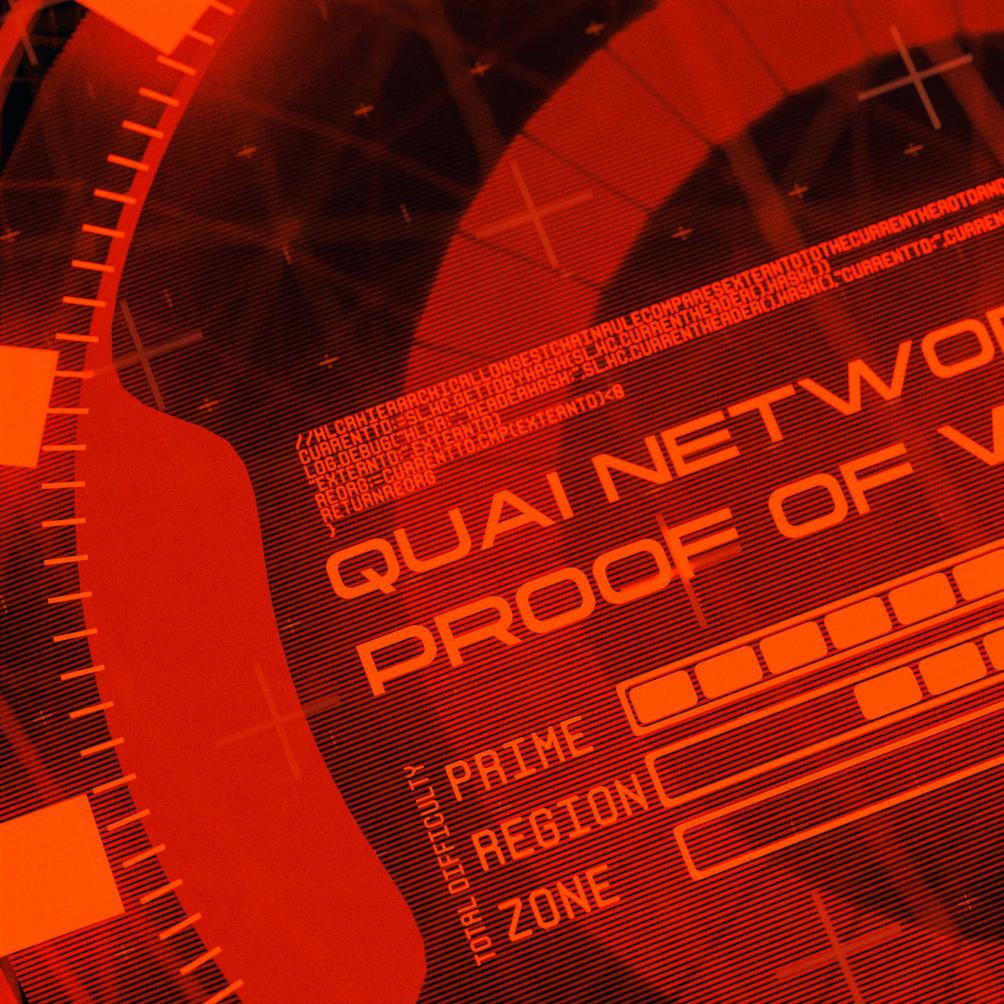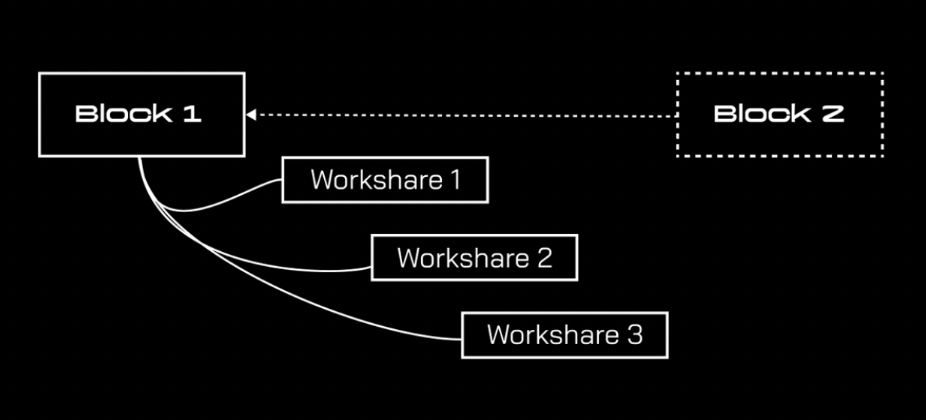
Innovation in Proof of Work (PoW) is alive and well. Quai Network is pioneering innovation with Workshares, which enhances traditional PoW by improving efficiency, security, and decentralization. Quai Co-founder Alan explained in a recent thread on X that Workshares are designed to address the historical inefficiencies of PoW and provide tangible use cases for energy within on-chain economies.
What Are Workshares?
Workshares are smaller, more frequent proofs miners can generate in shorter intervals, acting as mini-checkpoints in the blockchain. In traditional Proof of Work (PoW) systems like Bitcoin, miners compete to add entire blocks to the chain, which slows down transaction finality. Workshares, however, enable quicker intermediate validations—small steps of verification that occur more often—keeping the process secure but faster.

These intermediate validations mean that Workshares act as subsamples of the hashrate (the total computational power miners use to secure the network and process transactions. By functioning as smaller chunks of work, Workshares reduce the burden on miners and enable quicker checkpoints in the chain compared to traditional PoW systems. This allows miners to submit smaller proofs more frequently, helping smaller miners contribute more often and ultimately improving decentralization by lowering the reliance on large mining pools.
A good analogy is a wolf pack, where scouts locate prey and signal the pack to hunt more efficiently. Similarly, Workshares boost both speed and coordination within the chain, enhancing the overall network performance.
Workshares enhance both speed and decentralization by lowering barriers for smaller miners and distributing validation efforts more evenly across the network.
Why Workshares Matter
- Faster Finality: Workshares allow miners to generate proofs more often, reducing the time it takes to confirm transactions.
- Enhanced Security: Frequent checkpoints strengthen the chain’s security, making it harder for attackers to reorganize the chain.
- Increased Decentralization: Mining pools currently centralize power by pooling resources. Workshares enable smaller, independent miners to contribute more frequently, reducing reliance on these pools and promoting a more decentralized network.
- Improved Transaction Propagation: Workshares help transactions spread through the network faster by sending parts of them earlier. This allows the network to start verifying transactions sooner. By propagating (sending) transactions in smaller pieces, the system becomes more resilient, reduces delays, and avoids issues caused by network congestion during busy times.
Evolution of Mining Protocols
Mining protocols have continually evolved to handle the growing complexity and power demands of chains. As Bitcoin’s hashrate surged with the rise of ASIC miners in the early 2010s, the industry needed more efficient ways to manage mining resources. Stratum V1, developed in 2012, provided a solution by allowing miners to connect and submit work to pools more effectively. However, as hashrate skyrocketed—by nearly 16 million times—Stratum V1 quickly became inefficient for modern mining needs.
Stratum V2 was introduced to address these inefficiencies by optimizing bandwidth, reducing latency, and enhancing security. A key feature of Stratum V2 was giving miners more control over the transaction sets in their blocks, reducing the dominance of large pools. While promising, Stratum V2 has seen slow adoption due to the reluctance of large mining pools to relinquish control.
This is where Workshares, pioneered by Quai Network, introduces a fresh approach. By enabling miners to contribute smaller, more frequent work increments, Workshares allow individual miners to participate more consistently. This system directly addresses the centralization problem by empowering smaller miners to play a more active role in securing the network.
How Workshares Improve Decentralization
The centralization of mining power is a well-known issue in PoW networks like Bitcoin, where large mining pools—often controlled by entities like AntPool—dominate transaction verification. This concentration of power undermines Bitcoin’s censorship resistance, as only a few players control which transactions are added to blocks.
While Stratum V2 allows miners to select their transactions, the protocol hasn’t been widely adopted due to resistance from these large pools. At Quai Network, Workshares present an alternative by allowing miners to contribute smaller proofs of work more frequently, leveling the playing field and reducing dependence on large pools. By distributing power across a broader range of miners, Workshares increase network security and promote true decentralization, aligning with the core principles of PoW.
Optimizing Network Performance
Workshares are designed to make Quai’s Network the most efficient PoW Network.
Here’s how:
- Bandwidth Optimization: By bundling transactions inside Workshares and minimizing redundant data transmission, Quai reduces the overall bandwidth required. This results in more efficient communication across the network, protecting it from bottlenecks and improving resilience against attacks.
- Improved Latency: Workshares’ frequent validation speeds up the network, reducing delays and ensuring faster transaction confirmations.
- DDoS Protection: Workshares helps defend against large-scale DDoS attacks by reducing the bandwidth needed to process transactions. This makes the network less vulnerable to a sudden influx of low-fee transactions. It does this by distributing data in advance.
Incentivizing Workshares
To make Workshares appealing, Quai Network integrates the option of a dual miner reward system, ensuring miners are incentivized to produce both Workshares and full blocks. This approach smooths out variance in rewards, reducing the reliance on mining pools and making solo mining more viable. As a result, miners can experience more frequent payouts, promoting greater decentralization and fairness across the network.
The Future of Mining with Quai and Workshares
The adoption of Workshares can potentially transform the reward avenues for miners and improve the efficiency of Quai’s Network as a leader in PoW chain innovation by addressing inefficiencies, enhancing security, and promoting decentralization.
Implementing Workshares across Quai could remain a challenge, particularly in educating miners and encouraging adoption. However, as Quai pushes towards mainnet and continues to refine and promote this technology, Workshares could redefine the image of Proof of Work networks and strengthen the security of the Quai network for years to come.
Conclusion
Workshares offer a practical solution to some of the longstanding challenges in PoW, making it more efficient, decentralized, and secure at the protocol level. As Quai Network continues to grow and innovate, Workshares represents an exciting opportunity for miners—particularly those operating with smaller budgets—to participate in a more equitable and efficient system.
Keep an eye out for Quai Network’s Golden Age Testnet launch to get involved in workshares in the coming months.
